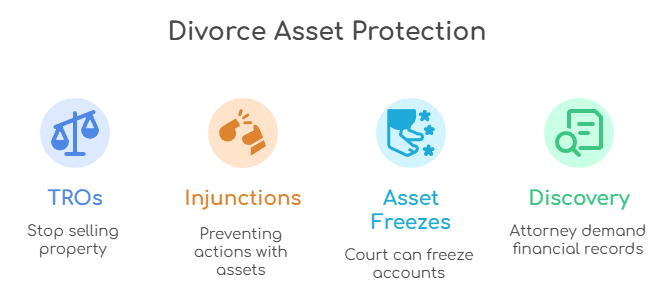Protecting Marital Assets During a Texas Divorce
Can a spouse sell or transfer property before a Texas divorce is final? In most cases, they are not legally allowed to do so without court permission.
If you’re going through a divorce and suspect your spouse is trying to move or hide assets, you’re not alone. Many people face the same fear—wondering if everything they’ve worked for might disappear before the divorce is finalized.
The good news: Texas law offers powerful tools to protect your financial interests. Let’s walk through what you need to know, starting with the basics and moving into practical legal strategies.
What Counts as Marital Property in Texas?
Trying to figure out who owns what in a divorce can be confusing. Just because something is in your spouse’s name doesn’t mean it’s only theirs.

Texas is a community property state. That means most property acquired during the marriage belongs to both spouses—even if only one name is on the title or account.
Community property typically includes:
- Income earned during the marriage
- Real estate bought while married
- Vehicles, bank accounts, and retirement funds
- Household furnishings and personal property
Separate property, which usually isn’t divided, includes:
- Property owned before marriage
- Inheritances or gifts received by one spouse
- Damages for personal injury (except lost wages)
A common mistake is assuming that if you paid for it or your name is on it, it’s yours. Texas law often treats such assets as joint property.
What the Law Says About Property Transfers During Divorce
Worried your spouse might sell the car or drain a bank account? Texas courts know this happens, and many counties act fast to prevent it.
When a divorce is filed, standing orders or Automatic Temporary Restraining Orders (ATROs) often go into effect immediately. These orders prohibit both spouses from:
- Selling, transferring, or concealing property
- Incurring unusual debts or liabilities
- Altering insurance policies
- Withdrawing large sums from accounts
Even if your county doesn’t issue automatic orders, you can request a temporary restraining order when filing. Violating these orders can result in contempt charges, fines, or adjustments in the property division.
Filing first can give you an advantage by putting immediate legal protections in place.
Signs Your Spouse May Be Hiding or Selling Assets
Worried your spouse is taking steps to hide money or offload property? Trust your instincts—especially if you’re seeing red flags like:
- Unusual withdrawals from checking, savings, or investment accounts
- Quick transfers of property titles to family or friends
- Selling items like cars, furniture, or electronics below market value
- Concealing information about income or accounts
These actions may be attempts to reduce the marital estate. They’re not just shady—they can be illegal, and courts can step in to fix the damage.
Legal Tactics to Prevent Unauthorized Sales
If you think your spouse is about to sell or give away marital property, you don’t have to sit by and watch it happen.

You can act quickly with these legal tools:
- Temporary Restraining Orders (TROs): These can stop a spouse from moving or selling property until a court hearing.
- Injunctions: A longer-term court order preventing specific actions with marital assets.
- Asset Freezes: The court can freeze certain accounts or require joint permission for withdrawals.
- Discovery and Subpoenas: Your attorney can demand financial records and depose parties to uncover hidden assets.
Judges take these matters seriously, especially when one spouse tries to gain an unfair advantage.
What to Do if Property Was Already Sold or Transferred
Already lost something valuable to a quick sale or suspicious transfer? Don’t panic—you may still be able to recover your share.
Here’s how Texas law can help:
- Tracing Assets: Courts can trace where property or money went and may order reimbursement.
- Value Offsets: The value of missing or sold property can be credited to the other spouse in the division.
- Sanctions or Fraud Claims: A judge may penalize the spouse who acted in bad faith.
The court’s goal is to achieve a just and right division of community property. That includes correcting for bad behavior.
What Happens If the Property Is Outside of Texas?
Not all marital property stays in-state. If your spouse owns land, investments, or other valuable assets outside Texas, don’t assume they’re out of reach. You still have legal options to protect your interests, even if the property crosses state lines.
Divorces don’t always involve only local assets. If your spouse owns or tries to transfer property located outside of Texas, you still have options. Texas courts can issue orders regarding out-of-state assets, and you may need to work with legal counsel in the other state to enforce those orders. Tracing and recovering these assets can take time, but it is possible.
Can I Freeze a Joint Bank Account?
It’s unsettling to think your spouse might clean out your joint account. If you’re worried about a sudden withdrawal, the law can help. Freezing an account quickly could make all the difference.
If you’re concerned that your spouse might empty your joint accounts, you may be able to request an emergency court order to freeze those funds. In many cases, a judge will allow each party to access a portion for living expenses while protecting the rest until final division. Always act fast and speak with your attorney before taking action on joint funds.
How to Document Suspected Asset Hiding or Sales
When things feel suspicious, don’t ignore your gut. The more details you can gather early on, the better chance you have of proving bad behavior later. Start keeping track now—it can make a major difference in court.
If you suspect your spouse is quietly selling off or hiding assets, documentation is key. Start tracking:
- Bank statements
- Real estate or vehicle transfers
- Texts or emails that hint at financial moves
The more evidence you provide, the stronger your case will be when you ask the court for help.
FAQs About Property Sales During a Texas Divorce
Can my spouse sell our home before the divorce is final?
Not without court approval or your written agreement. Doing so may violate standing orders and result in penalties.
What if the property is only in their name?
It may still be community property. Title doesn’t always determine ownership under Texas law.
How fast can I get an injunction to stop a sale?
Your attorney can request a temporary restraining order quickly—often within a day—especially if there’s a risk of irreparable harm.
Can I get compensated if they already sold something?
Yes. Courts can assign you a greater share of remaining assets or order financial compensation for what was lost.
What if they transferred it to a family member?
Transfers to friends or relatives can be reversed if they were made to hide assets or avoid fair division.
Talk to a Texas Divorce Attorney to Protect What’s Yours
If you’re going through a divorce, you need more than just emotional support—you need legal protection. Whether you’re dealing with a cooperative spouse or someone trying to outmaneuver you, don’t go it alone.
A Texas family law attorney can take swift action to freeze accounts, stop shady transactions, and make sure your financial future stays intact. Don’t wait until it’s too late to defend what’s rightfully yours.

